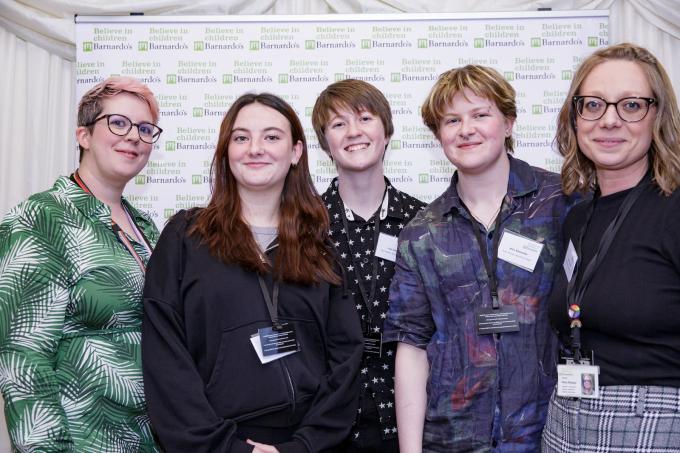We want Black children and young people to feel proud of who they are. Too often in the UK, Black children and young people face racial discrimination based on their hair and skin, impacting their self-esteem and opportunities, and affecting their chances in life.
The Barnardo’s SEEN Black Hair and Skin project aimed to highlight and challenge this discrimination and offer advice for professionals who work with Black children and young people to make sure their basic needs are being met.
We spoke with Portia Williams, Programme Manager at SEEN, who explains more about the project.
What problems is the Black Hair and Skin project trying to solve?
“Hair care and styling play an important role in the cultural practice of the Black community. But negative perceptions about Black hair still exist today as a longstanding result of racism. Black children and young people, and others, can internalise these biases leading to tangible consequences which reach far beyond internal trauma.
“Discriminatory policies and attitudes – especially within schools, care systems, and other institutions – continue to disproportionately affect Black children and young people.
“In the UK, Black children and young people can face restrictions in schools or workplaces on hairstyles including afros, braids, and locs. These policies not only reinforce harmful stereotypes but also stigmatise Black hair, forcing young people to conform to Eurocentric beauty standards. For those in institutions like the care system or schools, the lack of cultural understanding and provision of appropriate products, tools, and expertise for Black hair and skin care leaves many children and young people feeling alienated and neglected.
“We want all Black children and young people to have their hair and skin care needs considered and met in all settings. Through the Black Hair and Skin project, we wanted to shed light on the impact of discrimination faced by Black children and young people. We also wanted to empower professionals to better support Black children and young people by developing a more culturally competent understanding of what their needs are.”
How did you come up with recommendations to support Black children and young people’s hair and skin care needs?
“As part of the project, we commissioned research and published a report, Crowning Glory: Exploring the Stories of Black Hair and Skin. In the report, we explored the personal experiences and perspectives of Black children and young people in the UK, particularly those who have care experience and/or have been involved with youth institutions, in caring for their hair and skin.
“We found that the systemic challenges that Black children and young people face, particularly in relation to their hair and skin care, are deeply intertwined with issues of racial discrimination and cultural identity. The difficulty in accessing essential hair and skin care products isn’t just a logistical inconvenience; it reflects a wider societal disregard for the specific needs of Black children and young people.
“To launch the report, we hosted a powerful event in Parliament where we invited children and young people to share their personal love letters to their hair and skin, detailing their stories and experiences, and reflecting on the power of identity.”

To my beautiful hair, do you know why I love you?
When my mum washes you, you go so far down and when you get dry you bounce back up.
I also love you because we can do so many styles with you.
I love you when you're curly, I love you when you're in plaits, I love you when you have beads, I love you when you're in buns.
My mummy says you're beautiful in any kind of way and I know it's true.
Milan, 7

Dear Future Zion, I want you to know something truly special about yourself, something that makes you stand out in the most powerful way: your dreadlocks.
They’re not just a style, they're a crown that speaks of strength, resilience, and beauty deeply tied to your Black Caribbean roots.
Every loc carries the stories of your ancestors.
The echoes of rich culture that has endured and thrived against all odds.
Your hair’s a part of your identity, your heritage, your pride, and connection to the past and future.
Your brown skin shines with the warmth and depth that is a reflection of the earth, the sun, and the rich history of the Caribbean.
It’s the colour of generations who have lived, loved, and fought for freedom.
Zion, 15
“Our report made clear recommendations for how to challenge these systemic inequities, including mandatory training for foster parents, the provision of basic essential hair and skin care items, and better financial support from local authorities.
“And, while there are local initiatives by local authorities and NHS trusts to address the hair and skin needs of Black children and young people, having a standardised national policy would make sure that consistent, equitable care could be ensured across all regions. A standardised national policy would also promote cultural sensitivity and eliminate disparities in meeting Black children and young people's specific needs within the healthcare system.”

How we’re closing the financial literacy gap for children and young people
Barnardo’s SEEN is helping to close the financial literacy gap with our Money Matters project aimed at supporting children and young people to begin their financial education, especially those at greater risk of being excluded from school and those already excluded and in pupil referral units.

Amplifying children and young people’s voices and experiences
Children and young people should have opportunities to have their voices heard and be taken seriously in decisions that affect them. When young people are involved, we know this leads to better decision-making and improved services.

Need support with your mental health?
Everyone has mental health and it’s something we should all take the time to look after. Sometimes our thoughts and feelings can feel difficult to manage. If you’re struggling with how you feel, don’t worry, you’re not alone. Help and advice is available for you.

